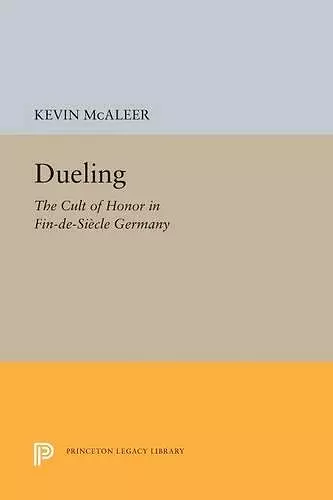Dueling
The Cult of Honor in Fin-de-Siècle Germany
Format:Paperback
Publisher:Princeton University Press
Published:1st Jul '14
Currently unavailable, and unfortunately no date known when it will be back
This paperback is available in another edition too:
- Hardback£95.00(9780691636887)

The question of what it takes "to be a man" comes under scrutiny in this sharp, often playful, cultural critique of the German duel--the deadliest type of one-on-one combat in fin-de-siecle Europe. At a time when dueling was generally restricted to swords or had been abolished altogether in other nations, the custom of fighting to the death with pistols flourished among Germany's upper-class males, who took perverse comfort in defying their country's weakly enforced laws. From initial provocation to final death agony, Kevin McAleer describes with ironic humor the complex protocol of the German duel, inviting his reader into the disturbing mindset of its practitioners and the society that valued this socially important but ultimately absurd pastime. Through a narrative that cannot restrain itself from poking fun at the egos and prejudices that come to the fore in the pursuit of "manliness," McAleer offers both an entertaining and thought-provoking portrait of a cultural phenomenon that had far-reaching effects. The author employs a wealth of anecdotes to re-create the dueling event in all its variety, from the level of insult--which could range from loudly ridiculing a man's choice of entree in an upscale restaurant to, more commonly, bedding his wife--to such intricacies as the time and place of the duel, the guest list, the selection of weapons and number of paces, dress options, and the decision regarding when to let the attending physician set up his instruments on the field. As he exposes the reader to the fierce mentality behind these proceedings, McAleer describes the duel as a litmus test of courage, the masculine apotheosis, which led its male practitioners to lay claim to both psychic and legal entitlements in Wilhelmine society. The aristocratic nature of the duel, with its feudal ethos of chivalry, gave its upper-middle-class practitioners even more opportunity to distinguish themselves from the underclasses and other marginalized groups--such as Socialists, Jews, left-liberals, Catholics, and pacifists, who, for various reasons, were stigmatized as incapable of "giving satisfaction." The duel, according to McAleer, was thus a social mirror, and the dueling issue political dynamite. Throughout these accounts, the author sustains a personal voice to convey the horror and fascination of what at first appears to be simply a curious fringe activity, but which he goes...
"[The book] contains excellent material on the mechanics of the duel, and penetrating passages on every subject it deals with. McAleer is often clever and always spirited."--David Blackbourn, London Review of Books "[A] well-researched and entertainingly written study."--Richard J. Evans, The Times Literary Supplement "[An] engaging and valuable monograph... [McAleer] has presented his account with verve, wit, and a rich and colorful vocabulary... This book deserves an established place in the bibliography on modern German society."--Vernon L. Ludtke, American Historical Review "A positively captivating look at turn-of-the-century Germany... "--D. R. Dorondo, The Historian "[McAleer] argues that dueling in Wilhelmine Germany, although only practiced by an aristocratic minority, helped shape German attitudes toward honor, women, and other countries... a fascinating glimpse into a deadly icon of the German popular imagination."--Library Journal "Between 1871, when the Franco-Prussian war ended, and 1914, when the first world war began ... German officers kept boredom at bay by killing each other in pistol duels... Kevin McAleer's book is extraordinarily comprehensive, taking the astonished reader through the dueling ritual from first provocation to final death agony."--The Economist "Kevin McAleer has dispelled any romanticism surrounding the nineteenth-century German duel... [He] wholeheartedly enters into the fascinating intricacies of dueling... [and] keeps his moral indignation at bay, with a tone of ironic humor throughout."--Alexander Rose, Literary Review "[This] portrait of Germany's dueling classes is vivid and appalling. It fully illustrates the book's wonderful epigraph, taken from W. Somerset Maugham: "Man has always found it easier to sacrifice his life than to learn the multiplication table."--Lee Lescaze, Wall Street Journal "Kevin Mcaleer has spent five years researching the fin-de-siecle German duel... The results ... are contained in this intriguing book. One is left staggered at the triviality of the causes for which men were willing to risk death... and at the pretentiousness of the pseudo-chivalrous etiquette of the German duel."--Sunday Telegraph (London) "... [a] lively, opinionated account of dueling in Germany. McAleer is thorough about the weapons, the customs, even the proper dress for dueling, and he's properly sardonic about the adolescent code of honor that perpetuated it."--Men's Journal "... the book has many virtues. It contains excellent material on the mechanics of the duel, and penetrating passages on every subject it deals with. McAleer is often clever and always spirited."--London Review of Books "[An] unusually lively, informative, and provocative description and interpretation of the duel in recent Germany's cultural, social, and legal history... McAleer concludes persuasively that Germany's dueling tradition ... leads inexorably to Nazism, a finding that ensures controversy. Based on archival and rare published materials and belles lettres, with illustrations and bibliography, this is a refreshingly unconventional, suggestive, and strongly recommended study."--Choice "A positively captivating look at turn-of-the-century Germany... The phenomenon of the affair of honor must, as it now appears in light of McAleer's efforts, be considered if one is to understand more completely the critical role of Germany's post-1890 internal evolution or that country's place in modern Europe."--D. R. Dorondo, The Historian
ISBN: 9780691608419
Dimensions: unknown
Weight: 397g
284 pages